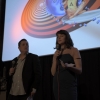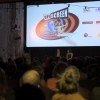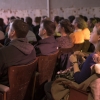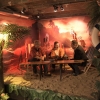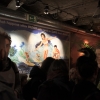Offscreen
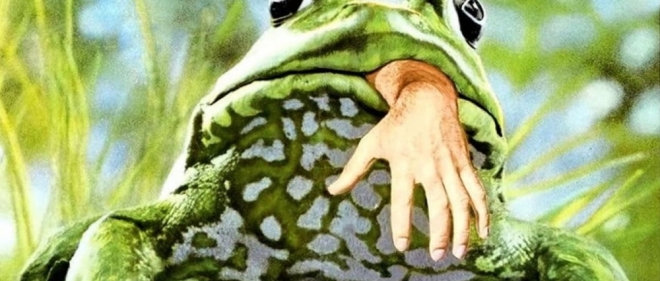
INTERNATIONAL SYMPOSIUM: ALL HELL IS ABOUT TO BREAK LOOSE: ECO-HORROR, ENVIRONMENTAL ANXIETY AND GENRE CINEMA
What is “Ecohorror”, Anyway? - Dr Emily Bourke (lecture in English)
This lecture explores the evolution of environmental anxiety in American horror cinema, arguing that the ecohorror subgenre merits reassessment in the face of global warming’s changing contexts. Greater awareness of the many threats emerging from our environment means that it no longer suffices to consider plants, animals, and landscapes to be ecohorror’s only subjects. Much as ecocriticism initially limited itself in its focus on “obviously” environmental subjects, so critical approaches to ecohorror have tended to overemphasise the importance of the “revenge of nature” plot, and missed opportunities to explore other terrors bound up in our current age of ecological catastrophe.
Dr Emily Bourke holds a PhD in English from Trinity College Dublin. Her thesis, Horror of The Anthropocene: American Ecohorror since World War II, traced the development of environmental themes in American horror fiction and film from the 1950s to the present. She has presented at conferences internationally on the subject of ecohorror, and co-organised the first international Gothic Nature conference in 2017.
“You have created a monster and it will destroy you!” Horror cinema and the precautionary principle - Dr Russ Hunter (lecture in English)
Despite its relatively low cultural-cachet, genre cinema has consistently engaged with environmental concerns by frequently expressing an ambivalent relationship between science and technology as a site of progress. Genre films seemingly as diverse as Frankenstein (1931), Godzilla vs. the Smog Monster 1971), The Crazies (1973), 28 Days Later (2002) and The Bay (2012) have engaged, in various ways, with humanity’s impact upon the environment and its potentially disastrous consequences. Yet, despite numerous examples of films that stress human complicity in the ecological disasters they portray, horror cinema, in particular has, often been dismissed as an ephemeral, trashy or meaningless genre. Utilising the precautionary principle, this talk will take a case-study approach to demonstrate the ways in which popular forms of cinema can be the site of often dynamic, insightful and urgent ecological messages.
Dr Russ Hunter is Senior Lecturer in Film & Television at Northumbria University and is the co-editor of Italian Horror Cinema. His scholarship has appeared in journals such as Studies in European Cinema, Film Studies, The Italianist and The Journal Italian of Cinema and Media Studies, as well as in books such as International Film Festivals: Contemporary Cultures and History Beyond Venice and Cannes (2018), Italian Horror Cinema (2016), Screening the Undead: Vampires and Zombies in Film & Television (2013) and European Horror since 1945 (2012).
Terre brûlée ou Anarchy in the UK - Frank Lafond (lecture in French)
In Cornel Wilde’s No Blade of Grass (1970), a virus from china causes world famine on our over-polluted planet. The film anticipates a real awareness of the environmental threat, which will result in the production of more known films tackling this theme in the seventies. No Blade of Grass turns out to be much more radical: Wilde accumulates excesses and acts of disruption, as if to mimic the social collapse he shows. But does one necessarily have to be subtle when there is a message to convey?
Frank Lafond is a series editor, a translator, and a film critic (he contributes in particular to La Septième Obsession). He has written books on Jacques Tourneur, Joe Dante, Samuel Fuller, as well as a dictionary of horror and science fiction cinema. He has edited several collective books devoted to George A. Romero, Georges Franju… His last book, Phase IV, éclipse de l’humanité, was published by Carlotta Films for their collector box set of Saul Bass’s film.
Eco-horror and the Cthulhucene - Matthias De Bondt (lecture in English)
Following Paul Reid-Bowen’s use of the term “Cthulhucene” to describe a monstrous age filled with other-than-human entities that exist beyond the grasp of human understanding, this presentation focuses on the ethical role that eco-horror plays in times when political, economic, ecological and epidemic monsters have surpassed any form of socio-cultural control or containment. In particular, Andrei Tarkovsky’s sci-fi film Stalker (1979) will serve as a prominent case-study, highlighting the way in which eco-horror gives voice to an ontological re-evaluation of the alien monsters that threaten to destroy the world as we know it. A close reading of this Russian masterpiece will disclose how eco-horror can help us to rethink the dominancy of anthropocentric thinking by acknowledging that other, non-human forces with radically different intentions may be at large in this world and that we quickly need to question our place among them if we are to survive.
Matthias De Bondt is a PhD Researcher and Teaching Assistant at the Institute for Media Studies at KULeuven (BE). His PhD project examines the representation, production and consumption of conspiracy theories in contemporary culture. His research interests mainly lie in the study of popular and fringe media-cultures (e.g. conspiracy, horror, sci-fi, fantasy, camp, snuff, exploitation, etc.) at the intersection of cultural sociology and cognitive media theory. As a teaching assistant, he supports several courses in the Bachelor and Master of Communication Sciences at KULeuven.
Free entrance. However, considering the limited capacity of these venues and the current corona measures, only a limited number of seats are available and we cannot guarantee that accreditation holders will always have access to a seat. You must, therefore, reserve a seat online.

